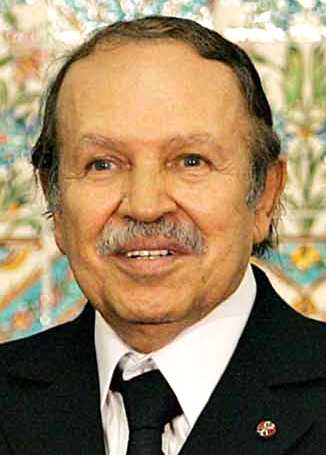 Algerian municipal government authorities announced Monday that they had banned an opposition rally calling for an end to Algerian President Abdelaziz Bouteflika's rule. WL Central reported on the planned rally and the unrest in Algeria here. The authorities said the protest could be held in an indoor venue instead of being a march, but the opposition Rally for Culture and Democracy (RCD) said it would defy the order and go ahead with the march.
Algerian municipal government authorities announced Monday that they had banned an opposition rally calling for an end to Algerian President Abdelaziz Bouteflika's rule. WL Central reported on the planned rally and the unrest in Algeria here. The authorities said the protest could be held in an indoor venue instead of being a march, but the opposition Rally for Culture and Democracy (RCD) said it would defy the order and go ahead with the march.
Today sixteen people were injured, including eleven police, during a violent protest in Skikda, eastern Algeria. Protesters succeeded in closing the National Road No. 3, the link between the major cities east of Algeria (the provinces of Constantine and Annaba) in the face of traffic for several hours by stones and barricades. They also set fire to rubber wheels in protest of a lack of clean water and social problems in their village. The violence began when the police attempted to clear the road.
Zohra Drif Bitat, a vice-president of Algeria's upper house of parliament who was appointed by Bouteflika, has strongly criticized the government, saying it had been unable to translate the country's huge energy wealth into a better life for the average citizen. "Are we going to continue to tackle our problems with the same actors who have failed? Don't we need new blood? I hope and expect a radical change in the mode of governance," she said on state radio.
Algerian President Abdul Aziz Bouteflika promised variety of reforms last week including more jobs, more democratic freedoms and the lifting of the 19 year state of emergency in the country. He also pushed through a $225 million package of price cuts on types of fuel and goods at government run stores after food riots had killed five people at the beginning of January, and pledged to spend $286 billion by 2014 to modernize the economy and build new infrastructure. There were local media reports last week that Bouteflika was preparing to reshuffle his government, and possibly fire Prime Minister Ahmed Ouyahia, but this has not been confirmed by any officials.
The rally on the 12th is being organized by the RCD which is part of the National Coordination for Change and Democracy (CNCD), composed of opposition parties and civil society groups. They intend to proceed with the rally and demanding the immediate end of Bouteflika's rule. "Algeria needs a revolution, not just the lifting of the state of emergency," Hocine Zehouane, the chairman of the Algerian League for Human Rights told Reuters. "Bouteflika's decision (to lift the state of emergency) is a non-event. We need to rebuild our institutions, we need a transitional phase of 18 months, and free and fair presidential and legislative elections."
The planned protest is not supported by Algeria's main trade unions or the biggest opposition forces, which were banned in the early 1990's but still have influence. A revolution in Algeria could have world wide economic impact because of the country's energy resources, but it may also be possible for the country to stave off a revolution by using those resources to meet the demands of the protesters.
Geoff D. Porter predicts in the Daily Star that Algeria will not revolt, and has a good analysis supporting his opinion. "A more nuanced explanation of why Algeria is different than other states in the Middle East is that Algeria effectively had its revolution, and has no stomach for another. In 1991, Algeria’s first multiparty elections were leading toward a triumph for the Islamic Salvation Front. The military stepped in and the country plunged into the Dark Decade – 10 years of violence and horrific bloodletting. The experience left many Algerians wary of abrupt change. They still seek change, but not if this means risking descending into another decade of chaos."
Theme by Danetsoft and Danang Probo Sayekti inspired by Maksimer